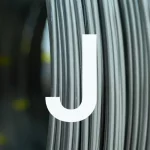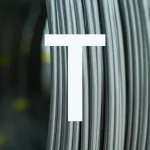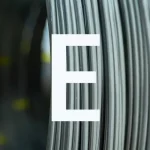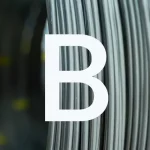MI cable is a specialized cable that ensures precise measurements and/or the transmission of electrical currents in challenging and hazardous environments. It resists oxidation and maintains low flammability, even at high temperatures. Magnesium oxide (MgO) is used to insulate the metal conductors, providing chemical and physical stability as well as resistance to ionizing radiation. The outer sheath can be one or more layers of metal alloys, chosen to provide protection for the environmental challenges of the specific application.
MI cables are also known as:
- Metal mineral insulated metal sheath (MIMS) cable
- Mineral insulated copper cable (MICC)
Kamet supplies both standardized and customized MI cable of the following product types:
What can be made with mineral insulated cable?
In general MI cable is used for instrumentation, power and control applications. On this page we will look at some specific examples of products that incorporate our MI cables and the kind of applications they are suited to.
MI power cables (conductor cables)
High-voltage and low-voltage MI conductor cables can be used to transmit electrical power in a wide range of applications from appliances in private homes to huge industrial processes. MI power cables offer a number of specific advantages:
- approved by electrical codes for use in flammable gas environments
- prevents explosion propagation inside the copper tube (the highly compacted insulation prevents the transmission of vapors, gases or flames between instruments)
- low risk of causing explosion even if circuit faults
- fire-rated
- durability, eliminating the need for replacement in challenging environments
- waterproof
- customized sheath materials can be chosen for maximum protection in any specific application environment
- flexibility, can be bent to fit intricate spaces
All these properties make MI cable a popular choice for power circuits, particularly for critical equipment in potentially flammable environments. Some examples include: nuclear reactors, hospital operating rooms, fire alarm systems, emergency power/lighting systems, public buildings, transport hubs, petrol stations, tunnels and mines.
MI signal or data cables
MI cables can be used for signal transmission, measurement and control. The cables designed for this purpose are known by various names including signal, data or instrumentation cables.
The entirely organic construction of MI instrumentation cable makes it extremely fire-, heat- and waterproof and thus the preferred choice for connecting various operations such as:
- control stations
- alarm and sprinkler installations
- emergency shutdown systems
- instruments that must remain functional during a fire
- communication circuits
For certain monitoring and measurement applications, accuracy and precision of data transmission is essential (eg signal transmission from sensors). In such applications, MI instrumentation cables with a solid copper sheath are chosen, since copper acts as an excellent electrostatic screen, preventing interference from external signals. This means that even weak signals can be accurately transmitted over hundreds of meters in hazardous environments such as vacuum, high pressure, vibration and extremes in temperature. A further advantage of the copper sheath is that it maximizes electromagnetic compatibility which means minimal separation is needed from other cables.
A wide variety of industries make use of MI data cables designed for their specific applications, from safety in public buildings, to process control in large scale industrial applications. MI signal cable is highly resistant to ionizing radiation which means it is also used for instrumentation in nuclear industries as well as high-tech applications such as aerospace and cryogenics. For cryogenics, MI cable is used to filter electromagnetic noise which comes in handy for LF (low-frequency) signals. The isolation ensures that noise is filtered, which ensures that qubits (computing power) can be measured in low frequency bands. Often this technique is used in quantum technology.
MI fire safety cable
MI fire safety cable refers to any MI cable that has been designed and certified specifically for fire and heat resistance. Most often these are MI power cables or MI signal cables with copper conductors and sheaths.
MI heating cable
MI heating cable is chosen for thermal control and frost protection in industrial processes where any of the following apply:
- High power is required
- Process temperature is high
- Cryogenic environment
- Installations requires flexible, small diameter cables in long cuts
- Heaters are exposed to a hazardous environment
MI heating cable is also used to prevent surfaces from freezing e.g. ramps (pedestrian or road), helicopter landing pads, football grounds and roofs. It can also be a more economical option for floor heating as it requires less power than conventional systems while providing very even heat distribution.
What are some examples of industries that use products made of mineral insulated cable?
Nuclear plants
Testing, monitoring and controlling of temperatures is critical in nuclear power plants in order to control reactions in the core. It is extremely dangerous if instruments for temperature control receive inaccurate readings. As such, MI cable (e.g. thermocouple, RTD and signal cable) has a crucial role to play in this regard due to its accuracy and reliability in hazardous environments.
Further characteristics of MI cable that make it well suited to nuclear industries include:
- extreme durability which is a great advantage due to the high-risk environment with regard to repair or replacement of components
- Exceptional radiation resistance due to the magnesium oxide that is used for MI cable insulation
- inorganic construction means there is a much lower chance of failure, damage or fire
- MI signal cables meet the stringent high-temperature electrical insulation requirements
Some specific examples of MI cable use in nuclear power plants include.
Safety control systems use neutron detectors, both in-core and out-of-core, which are connected by means of MI signal cables. Thanks to the design of MI cables, this pulse or current can be transmitted at high temperatures, pressure and radiation without being influenced by environmental electromagnetic fields.
Post-accident services in which systems are required to still measure gamma radiation levels inside a containment building. MI cable and connector systems can accurately transmit these measurements even in the adverse conditions of a nuclear disaster.
Marine applications
Thanks to the waterproof nature of MI cable in salt water environments, MI cable assemblies are being used:
- to connect warning beacons at sea
- as a solution to electrical wiring challenges on oil tankers and other marine vessels operating in extreme climatic conditions
These are simply a few examples of how MI cable products can be used in various industries. A huge range of industrial processes make use of our MI thermocouple, RTD and heating cable, especially in hazardous environments with hot, corrosive or explosive atmospheres. Should you wish to know more about what role MI cable products could play in your specific application, then please contact us.
Kamet has over 30 years of experience and the high standard of our certified product range guarantees that our MI cable and service will meet your particular needs. Aside from our standard stock of TC cable or MI RTD cable, there are many options for the customization of our various MI cables. Should you need any further information or advice about using MI cable for your particular application, then please contact us. Our team of experts will be happy to help and are quick to respond.








